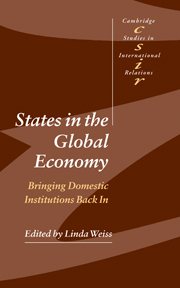Book contents
- Frontmatter
- Contents
- List of figures
- List of tables
- List of contributors
- Preface
- 1 Introduction: bringing domestic institutions back in
- Part I The resilience of welfare states
- 2 Disappearing taxes or the ‘race to the middle’? Fiscal policy in the OECD
- 3 Withering welfare? Globalisation, political economic institutions, and contemporary welfare states
- 4 Globalisation and social security expansion in East Asia
- Part II New economic challenges, changing state capacities
- Part III Governing globalisation
- List of references
- Index
- CAMBRIDGE STUDIES IN INTERNATIONAL RELATIONS
2 - Disappearing taxes or the ‘race to the middle’? Fiscal policy in the OECD
Published online by Cambridge University Press: 22 September 2009
- Frontmatter
- Contents
- List of figures
- List of tables
- List of contributors
- Preface
- 1 Introduction: bringing domestic institutions back in
- Part I The resilience of welfare states
- 2 Disappearing taxes or the ‘race to the middle’? Fiscal policy in the OECD
- 3 Withering welfare? Globalisation, political economic institutions, and contemporary welfare states
- 4 Globalisation and social security expansion in East Asia
- Part II New economic challenges, changing state capacities
- Part III Governing globalisation
- List of references
- Index
- CAMBRIDGE STUDIES IN INTERNATIONAL RELATIONS
Summary
At least in the Anglo-Saxon countries – Australia, Britain, and the United States – we have grown accustomed to the all too familiar refrain, almost always proclaimed by right-wing governments – that under globalisation, taxes are ‘disappearing’ and that ‘there is no alternative’ but to slash spending on education and welfare. Ironically, many academics – especially radicals and Marxists – endorse this proposition; ‘ironically’ that is, because they have not sought to critically appraise this opportunistic right-wing rhetoric and have effectively fallen for it ‘hook, line and sinker’. This chapter examines the evolution of taxation policy since 1965, and reveals this as but empty rhetoric, pointing to the clear fact that states have room for fiscal manoeuvre under globalisation (even if, in turn, this should not be exaggerated). This leads to the robust conclusion that ‘reports of the death of taxation and the welfare state remain greatly exaggerated’. Among other things, this chapter calls for a ‘middle-ground’ position in the politics of globalisation: between the ‘politics of helplessness’ (right-wing liberalism) and the ‘politics of despair’ (radical critiques). I argue that there are in fact some grounds for optimism and some grounds for political re-empowerment in terms of the cause for social democracy: that under globalisation ‘there is an alternative’ to the niggardly politics of neoliberalism.
Outside of mainstream politics and within the Academy, the discussion of globalisation is often conducted in the form of a debate, which is marked by two extreme polarities.
- Type
- Chapter
- Information
- States in the Global EconomyBringing Domestic Institutions Back In, pp. 37 - 57Publisher: Cambridge University PressPrint publication year: 2003
- 16
- Cited by

